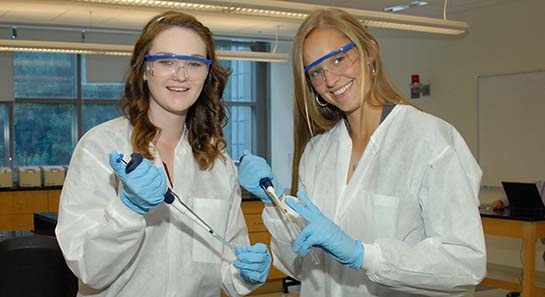 |
|
Katrina Terry (left) and her research partner, Haley Broomell, began the research
during a summer program at Cabrini College. |
The American Society for Microbiology has published a paper that was co-authored by Katrina Terry, a junior biology major.
The article provides notice to the scientific community that the mycobacteriophage genome called Cabrinians has been sequenced. It discusses the methods and protocols used to assemble the sequence, as well as initial findings about the functions of its genes. Mycobacteriophages are viruses that can infect Mycobacterium tuberculosis (TB).
In annotating the Cabrinians gene sequence, Katrina and her fellow researchers had to make judgment calls about the locations of the start and stop sites are for each gene in the sequence and their functions. They referenced multiple databases to verify their judgment calls. To annotate a genome 56,669 base-pairs long takes hundreds of hours. In order to be published, their work also passed inspection by the annotation quality control team at the Howard Hughes Medical Institute Science Education Alliance Phage Hunters Advancing Genomics and Evolutionary Science (HHMI SEA-PHAGES) program.
“This latest article adds to Katrina's developing body of published research that establishes her professional identity as a productive researcher,” explained Elizabeth Moy, executive director of the Southeastern Pennsylvania Consortium for Higher Education (SEPCHE). “Few students have the opportunity to publish as an undergraduate; Katrina's continued productivity will distinguish her as a prospective candidate for graduate school.”
The research began with a 2014 pilot course, made possible by SEPCHE. Members of the organization’s STEM faculty workgroup developed a summer undergraduate research experience and nominated students for the class.
“This project has enabled Katrina and her collaborators to contribute new knowledge to the field of genomics and bioinformatics,” said David Dunbar, the Cabrini College professor who supervised the research. “Their skill acquisition and their research discoveries are increasingly important to the scientific community, where interest in developing targeted medical and environmental treatments is growing exponentially.”
As for the practical applications of knowing more about viruses that infect bacteria, there may be therapeutic potential for treating humans. Research with phages to treat human bacterial diseases was abandoned decades ago with the advent of antibiotics. With the recent rise of drug-resistant bacteria, however, phages are receiving more scientific attention for possible medical uses.
 CHALLENGE
CHALLENGE





